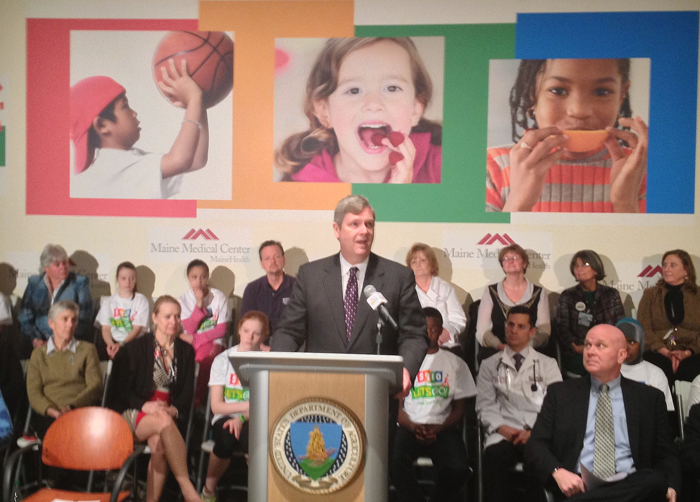PORTLAND — U.S. Agriculture Secretary Tom Vilsack on Thursday said improving childhood nutrition and preventing obesity is a critical issue to helping young people thrive in their personal health, educational attainment and economic achievement.
Vilsack spoke at Maine Medical Center on the Agriculture Department’s efforts to raise awareness in promoting proper diet and exercise for young people.
“There are twin evils – hunger and obesity. There are youngsters who are dealing with weight issues and youngsters who are not being fed at all,” Vilsack said. “These youngsters are in a world of global competition. They’ve got to be on top of their game.”
Proper nutrition stems from making good choices, having access to healthy foods and awareness about what healthy foods are, he said.
In Maine, 7.8 percent of children and adolescents are obese, according to a 2012 study by the University of Maine. Including adults, 23.1 percent of the overall Maine population is obese. The study found that the annual medical costs of obesity in Maine are roughly $453 million.
Vilsack raised the issue of New York City Michael Bloomberg banning large sugary drinks, a measure that was struck down by a judge earlier this week. While the topic was important, Vilsack said he hoped that the court battle didn’t distract from bigger discussions about nutritional improvements nationwide.
“We don’t want that court battle to redirect people from the big picture,” Vilsack said. “Healthy choices are available. Appropriate portion sizes are available. We need to refocus from the small battles to focus on big issues on calories in, calories out.”
Vilsack said the national discussion of food, nutrition and exercise is going to require time, adding that “it has to become ingrained in the way people live and the way people do business.”
In addition to proper nutrition affecting health, education and economic issues, Vilsack said food and fitness was also a national security issue. After speaking at Maine Medical Center, Vilsak also visited the U.S. Coast Guard station in South Portland.
“There is a shrinking number of young people physically fit and able to serve,” Vilsack said.
Only one in four Americans between 17 and 24 years old are fit and able to serve in the armed forces, in part because of overweight or obesity issues, according to the USDA.
Vilsack said it will require a generational shift to change habits, tastes, and perceptions about food. As a result, the USDA is starting to target young children to educate them about food choices and give public assistance programs for children access to healthier foods.
“We know for a fact that youngsters who are obese and have weight-related disorders will take chronic diseases into adulthood,” said Vilsack, who said that leads to higher medical costs.
Vilsack came to Maine as part of the USDA’s efforts to highlight School Nutrition Month. The department chose Portland to promote its cause because of initiatives the city has made to improve school lunch programs and the farm-to-school program, which encourages schools to buy locally produced fruits, vegetables and meat.In November, Portland schools were awarded a $100,000 USDA grant to support and expand its farm-to-school programs.
Vilsack joked that it didn’t hurt that USDA Under Secretary for Food, Nutrition and Consumer Services Kevin Concannon is a native Mainer. Concannon was sick on Thursday and missed the day’s events.
During his visit to Maine, Vilsack said he met with two dairy producers and discussed the threat that milk prices could rise unless a new farm bill is passed. The names of the dairy producers he met with was not immediately available.
The potential doubling of milk prices nationally was averted by the “fiscal cliff” agreement that extended portions of the expired 2008 farm bill through September. Americans had faced the prospect of paying $7 for a gallon of milk if the dairy program had lapsed and the government returned to a 1948 formula for calculating milk price supports.
When asked whether a new agreement could be reached by September, Vilsack said “we’re hopeful. But the clock is ticking.”
“We’re encouraging Congress to complete the work on the farm bill,” he said.
He said Congress must reach a new agreement, but issues such as sequestration – the automatic federal spending cuts that were triggered on March 1 – was creating some distractions.
Send questions/comments to the editors.





Comments are no longer available on this story